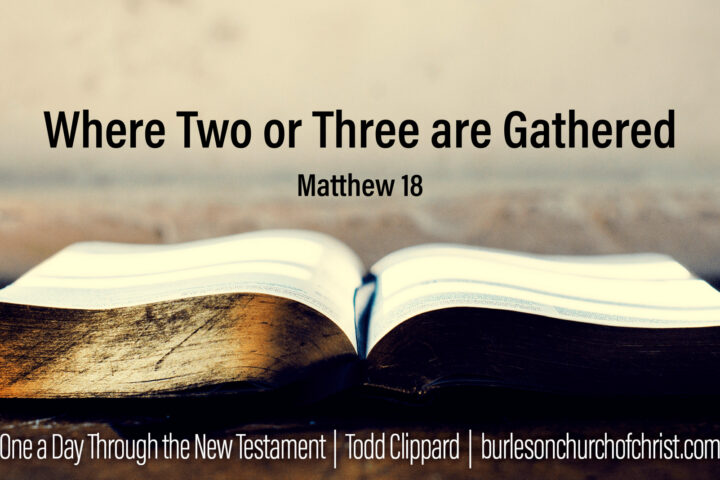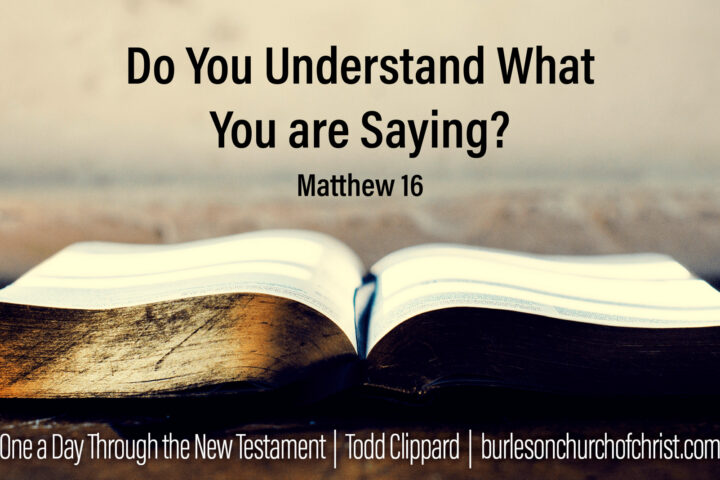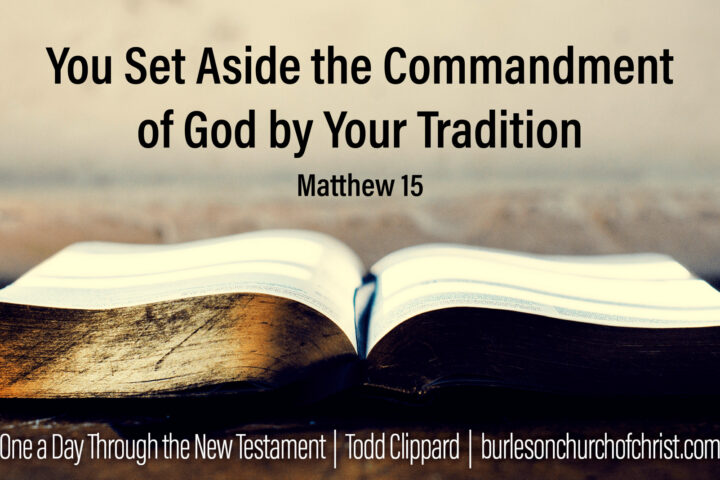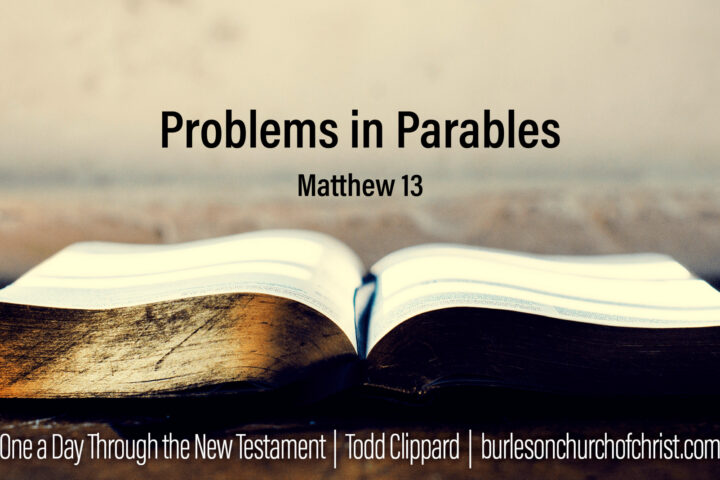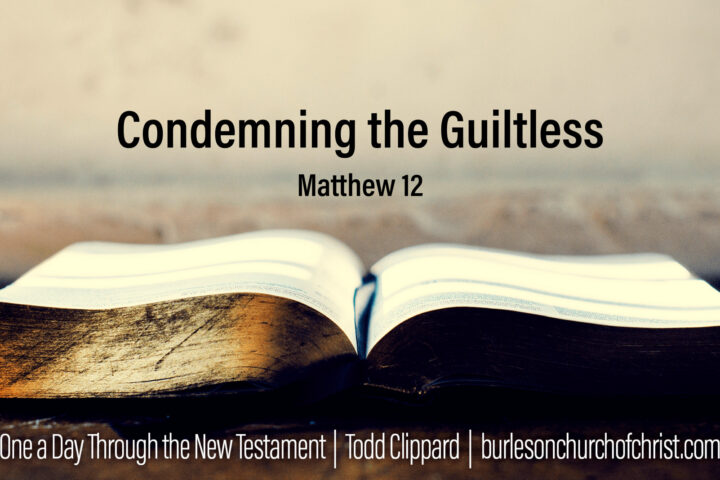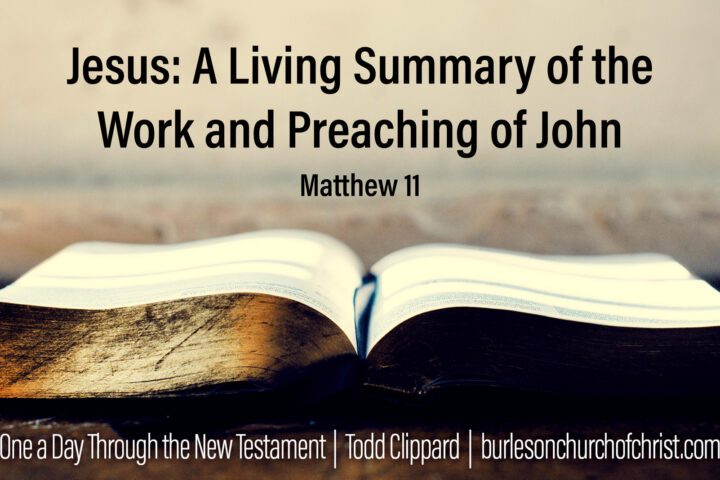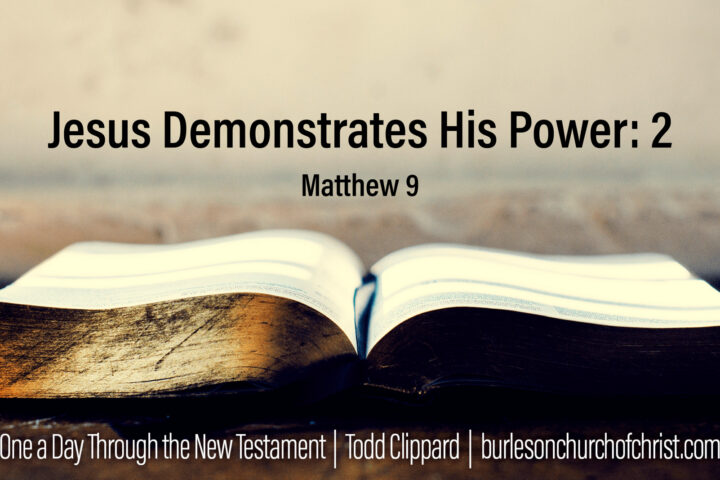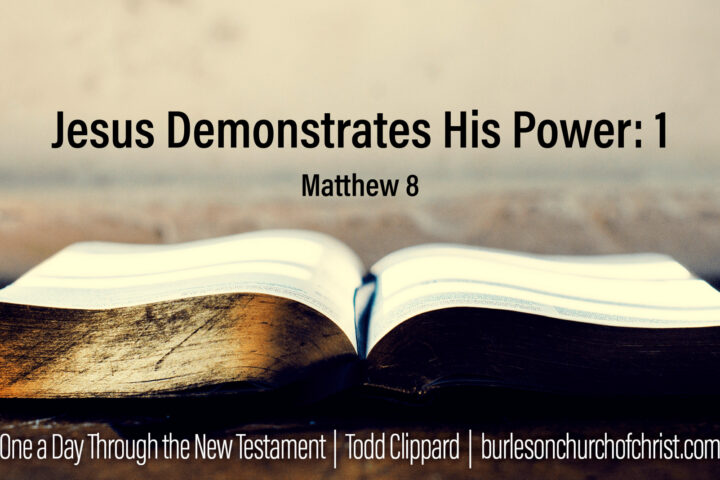Posts by Todd Clippard (Page 4)
Matthew 18: Where Two or Three are Gathered
While Matthew 7:1 is the go-to text for the biblically illiterate everywhere, and only the first two words at that, fewer texts are more abused among shallow thinking Christians than Matthew 18:20. Ten times out of nine (yes, you read that correctly), this verse is used in reference to the worship of God. One line of thought is to comfort those who of necessity must worship in extremely small groups. However, the far greater use of the text is by…
Matthew 16: Do You Understand What You are Saying?
One of the most well-known statements in all of Scripture is found in Matthew 16:16, where Peter made what is often called “the good confession.” Much could be said of the religious error and confusion about Jesus’ response in verse 18, but I want to focus on the verses that follow, specifically verses 21-23. Following Peter’s confession of Jesus as the Christ, Jesus began to teach them about His suffering and death which would be accomplished in Jerusalem. Rebuked by…
Matthew 15: You Set Aside the Commandment of God by Your Tradition
In yet another baseless attack against the Lord and His disciples (cf Matt 12:1ff), the Pharisees confront Jesus about defilement by eating with unwashed hands. Unlike the first attack, wherein the Pharisees accused Jesus based on their adherence to hedges created around the Law, this matter was admittedly one based solely upon human tradition (v 2). Rather than dealing head on with their error, Jesus first points out their own lack of adherence to the Law in the matter of…
Matthew 14: A Good Conscience Makes a Soft Pillow
Herod murdered John the Baptist at some point between Matthew 11 and Matthew 14. To me, this makes Jesus’ statements of comfort to John in chapter 11 even more poignant. Shortly following John’s death, word came to Herod of the great deeds and miracles associated with Jesus’ ministry. Though John had worked no miracle (John 10:41), Herod believed that Jesus was an incarnation of John, empowered by God to perform miracles. For what purpose and to what end Herod feared…
Matthew 13: Problems in Parables
Matthew 13 introduces us to Jesus’ first use of parables as narrative teaching. The word “parable” is a transliterative form of the Greek paraballo, a compound word joining para(beside) with ballo(to throw). You may recall learning about the Spanish bola, a rope with weighted balls at the end which was thrown at the legs of animals to tangle its legs together. In like fashion, a parable is a fictional narrative “thrown” with the intent of joining a spiritual meaning in…
Matthew 12: Condemning the Guiltless
Matthew 12:1-14 illustrates the difficulties associated with the Pharisees’ view of keeping the Mosaic Law. The Law’s specific 613 “Thou shalt” and “Thou shalt not” passages were not clear enough for a stubborn people. Nothing could be left to conscience or personal judgment. The hedges they built around the Law as a safeguard now became considered as laws themselves. Jesus pointed out their hypocrisy and lack of understanding by reminding them of how David and his men actually did something…
Matthew 11: Jesus: A Living Summary of the Work and Preaching of John
Matthew 11 is divided into three distinct sections: the first concerns John the Baptist, the second notes Jesus’ condemnation of the unrepentant cities, and the final section is Jesus’ invitation to rest. In verses 1-6, Jesus reassures John that his faith is not in vain by pointing to the nature of His work and audience. Like His forerunner, and unlike the religious leaders of the day, Jesus lived and worked among the common man, and was gladly accepted by them.…
Matthew 10: Jesus Delegates His Authority and Prepares His Delegates
Matthew 10 is a record of what is commonly called “the Limited Commission.” It is so called because, as opposed to the Great Commission of Matthew 28 and Mark 16 which included the whole world, this sending was only to the house of Israel (vv 5-6). As with any delegated authority, there must be some means of proving that authority. In the days of the Old Testament, one could provide documentation sealed (authorized) with the king’s signet (Est 3:12; Dan…
Matthew 9: Jesus Demonstrates His Power: 2
Matthew 9:1-8 is one answer to using of the thief on the cross as an argument against baptism being necessary for salvation. The first is that the thief died more than a month before Jesus commanded it (cf Mk 16:16). But in this case, we see that Jesus had power on earth to forgive sin (v 6). This power was demonstrated in His healing of the paralytic. One thing that strikes me is the misunderstanding on the part of those…
Matthew 8: Jesus Demonstrates His Power: 1
Matthew 8 is the beginning of a series of events whereby Jesus demonstrates His Divine power in an undeniable fashion. In Matthew 8:1-4 we find the Lord healing a leper. What is particularly moving about this account is the fact that Jesus touched the man to heal him, even though such was completely unnecessary (as we will soon see in verses 5-13). The leper was a pariah among the Jewish populace. The Law of Moses prescribed quarantine for those so…
